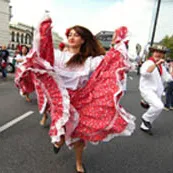„Eating Pierogis and reading Fernando Pessoa; Reading Szymborska and eating sardines”
I do not know what it means to be Portuguese. I don't know what is to be Polish. I looked at the bookstore section of scientific books. There was nothing. Then I talked with some people. We all have ideas. But depending on your point of view. The observed or the observer. This time, let’s forget the other’s theories. This text is not an explanation. It’s a simple exercise of approximation.
I had an anthropology professor (from Chile) who told us that he did not know if Portugal was Lisbon or if Lisbon was not Portugal. You could say the same about Warsaw and Poland?
Looking at distance it is only one country, but up close, there are different regions, north, south, east, west, and this means also different ways of being Polish or Portuguese.
I have ideas based on observations. The cultures of each country, as some objects should be left in its original place to be better appreciated and its shine be more true. I accept mixtures, experiments, a bit of Portugal in Poland and vice versa. But the laboratory of each one only works in the fullness in every proper place, as if space, time, weather and people were the main ingredients. I am not in favour of standardization of cultures. I like the differences. Culture cannot be packaged and sold in a supermarket. We can touch it, feel it, experience it. Staying in a level surface or hold your breath and dive down to their depths. You can also choose to bring a guide or not. But the GPS can be just curiosity, this rare positive defect that make us want to learn more.
We can speak about history, society, climate, food, culture, native inhabitants, experience a different culture through all of our senses (we are too accustomed to our own culture and our body always tends to the smallest effort, that why the foreigner sometimes see some things better than us).
A bit of Poland: architecture, landscape, woman faces, urban planning, train stations, spelling, sculptures, fabulous colour of the trees in autumn, polish beer labels, advertising outdoors, Tatra mountains, the smoke from the chimneys on winter, the horizon of the Baltic Sea, grey, brown, green, (green!), white, phonetics of the language, the names of people, the short names of people, the voices of others, walking in the snow, Chopin's piano, the sound of my voice when I try to speak Polish, the smell of food, soup, pierogi, makrela, smoked cinnamon in coffee, chocolate warm in winter, the subtle smell of damp fresh grass in spring, the smell of charcoal in some villages in the winter pole, touching the snow with the hands, feeling the cold on the face, the water of the Baltic in summer, warm clothing to the skin, the rain on the skin, the feet in the grass, vodka, tea, kefir, the thirty (or more?) brands of beer, smoked fish, hot mountain cheeses, forest berries, wild mushrooms, hot wine, everything faster.
We start with the idea that no culture is equal. I see culture as a house in which you could enter. This house have windows. You can live in it or just be there for holidays. It is already there before you arrived. However when you start to bring your objects into the house also begins to be yours. Culture and architecture. All this if you want to enter. If you see the house only from outside, the word for this is tourism.
I think about human architecture, the architecture of the Portuguese, the architecture of the Poles. And I think an architecture that blends these two architectures. Also the architecture of sounds, words, gestures. The architecture of all that is invisible and shapes us. Also the architecture of the wind, sun, rain, snow.
Now Portugal. Ideas, images, very personal free associations: sea, land, towns that looks like villages (already visited the city of OPorto?), long summer nights, fish, slow pace, poetry, cafes, light, colours, water, food, plains, trees loose, Mediterranean diet. The word south written on the horizon and in the eyes of old men's sitting on benches in the evening.
How to say? There are things that aren't on maps or in Google Earth. Each one has a real and imaginary country. A country without beginning or end, without time.
Each one of us has a map which brings us directly to ourselves.
Antonio Xavier










